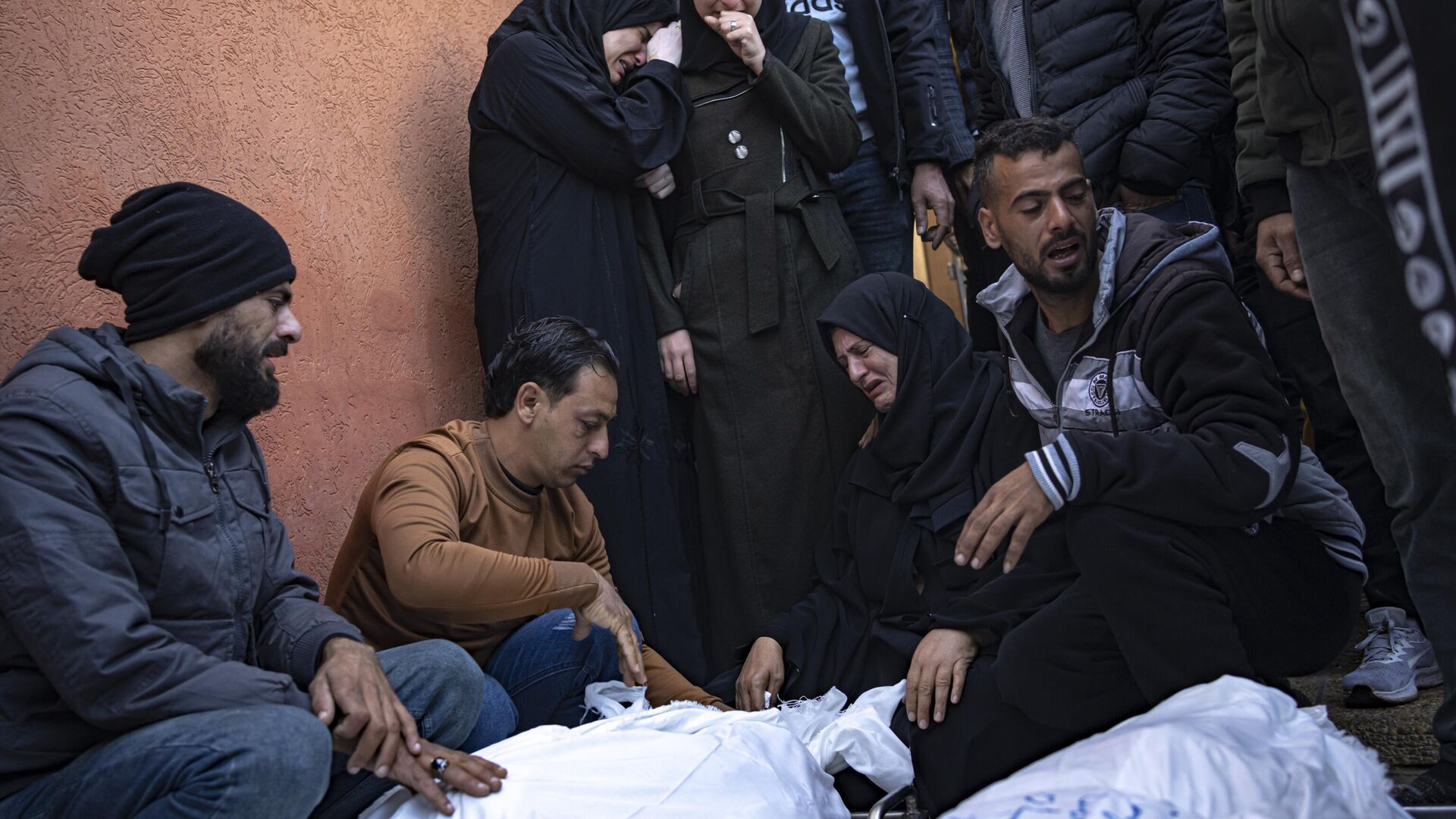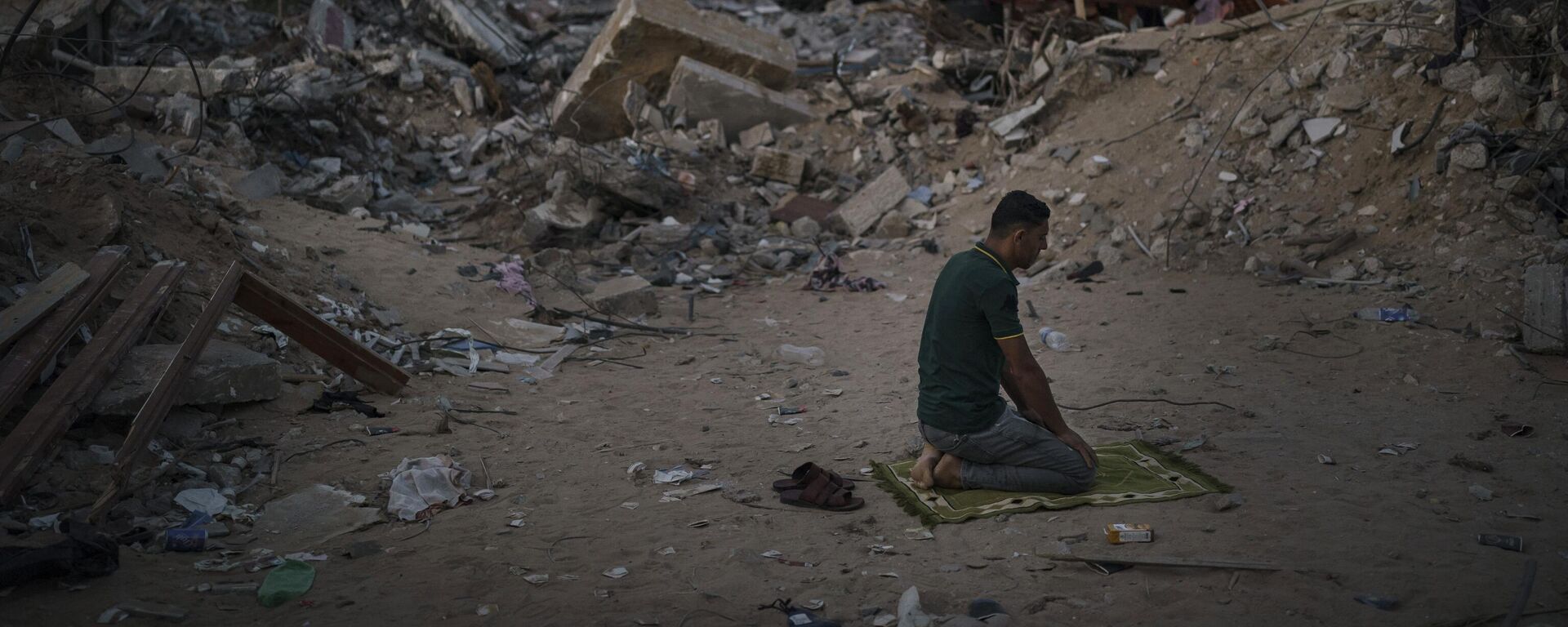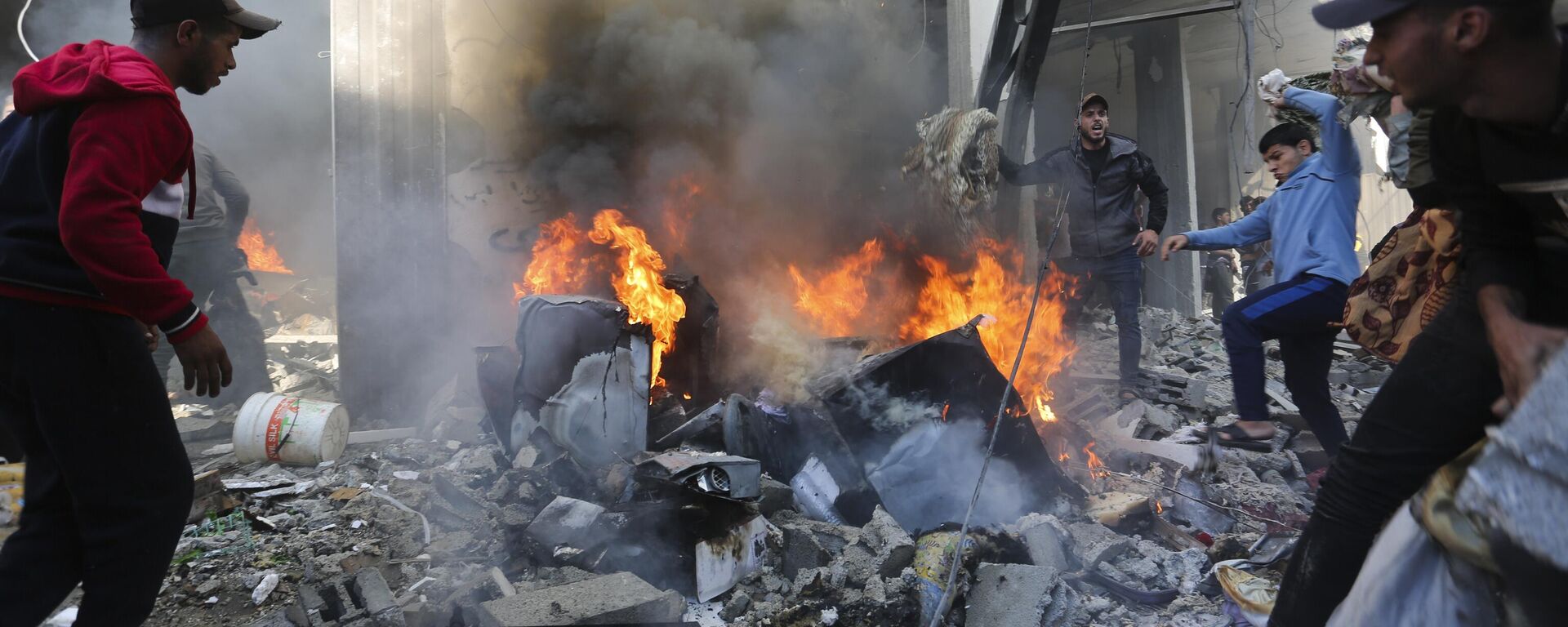'Death Was Everywhere': Sputnik Correspondent Shares Story of Evacuation From Gaza

© AP Photo / Fatima Shbair
Subscribe
MOSCOW (Sputnik) - Tarek Alyan, a Gaza-born Sputnik correspondent, arrived at work at the news agency as usual on a snowy November day, with nothing to suggest that he had been in the Gaza Strip, the world's hottest spot at the moment, just a few days ago, before finally being evacuated from the enclave with his family.
Alyan, who has been working at the agency for many years, was the only Russian reporter in the Gaza Strip after the conflict between Israel and Palestinian movement Hamas broke out on October 7. But war was nothing new to him: when he was just five years old, he lost his father while in Gaza.
"On the morning of October 7, we woke up from the volleys of missiles and the sound of the Iron Dome working. Everything seemed as usual for the first minutes. But the shelling lasted for over 15 minutes, and then a broadcaster reported on an emergency statement by a Hamas spokesperson. And then it became clear that something on a large scale had started," Alyan recalled.
That morning, Hamas fighters shelled Israeli settlements, with the movement's mobile units attacking positions of the Israel Defense Forces on the Israel-Gaza border, catching them off guard. The Israeli military started shelling Palestinian cities in response.
The correspondent said that as he was at home with his family that day, he realized after the first minutes of the attack that he had two main goals in mind — to fulfill his professional duty as a reporter and to save his wife and daughter.
"Strikes were conducted chaotically. Employees of international organizations left their offices and houses and departed from the enclave almost immediately. It became clear that we were left alone in the area," Alyan explained.
When discussing a possible evacuation from the Gaza Strip, Alyan's wife told him point-blank that either they would all leave the enclave together or everyone would stay. The situation was escalating, and over the course of the first days of the attack, the correspondent regularly visited places where shelling had taken place and civilians had lost their lives.
Photos and reports about the massive destruction, the children who had been killed, and their devastated families were sent to the news agency on a daily basis, despite frequent issues with communication.
Death Was Everywhere
Comparing the current conflict with previous periods of escalation in the area, the Sputnik correspondent noted that such massive strikes on the enclave were unprecedented. He witnessed children dying at their parents' hands, as well as children trying to recover the already lifeless bodies of their close ones.
"We don't know what the death is. But it was everywhere. In one of the districts, a boy went out to cover a car, but came under shelling. His father was looking at his body out of the window for six days, but couldn't take it and bury it because of the shelling. People under the debris called their close ones, unless the battery was low or the death took them away. In hospitals, fathers were dying from injuries with their children, while holding each other's hands. And we all saw it with our own eyes and wanted to tell the world about it and show it," Alyan continued.
Around 70 journalists have been killed in the Gaza Strip since October 7, media reported. Many of them were Alyan's colleagues, with whom he has occasionally worked with since 1998. There are also some young reporters who have also been killed, the Sputnik correspondent also said.
"It was always scary. Yes, you get used to it, seeing death and tragedy repeatedly, but you are afraid that your family could die, or they couldn't reach you, or you would receive a message that a friend or a close one had died while you were at work," Alyan explained.
Absent From List
Weeks after the attack, the reporter eventually decided to leave home with his family on the recommendation of Russian diplomats, taking with him a group of compatriots, including a woman with children who had asked for help.
The day after Alyan left his home, he received a call from a friend who told him that his house had been shelled overnight, with two rooms seriously damaged.
Like dozens of other Russian citizens, Alyan had to go to a school building to await the evacuation, which dragged on for over a month.
The reporter received lists with the names of his compatriots who were about to be evacuated, and people came to him with the hope of hearing their own names. Alyan himself was hoping to see names and surnames of his wife and daughter as the time went on.
As many as 2,000 displaced persons were in the school at one moment. The UN Relief and Works Agency for Palestine Refugees in the Near East refused to consider the school as a temporary shelter, and people started to look for water and food on their own.
"Yes, up until the last days [in Gaza] we lived on canned foods in the hope that everything would soon end. Then, women started to cook potatoes and everything else we had on fires spending three-four hours to feed around 40-45 people. In the last days, they started to give us food and water. A piece of chicken, rice and 1.5 liters of food were provided daily to four people. That was the reality," Alyan added.
The reporter recalled that one of the most difficult days was the day when their names were on the evacuation list and they went to the border checkpoint.
"We stayed there until 3 pm But then, an error occurred in the process, and Egyptians didn't let us out, saying that our surnames were absent from their lists," the Sputnik correspondent said, while checking notifications on his phone about the latest developments in Palestine.
Difficult Adaptation
The day of evacuation finally came. Staff of the Russian Emergencies Ministry, doctors and diplomats were waiting for him on the Egyptian soil.
When asked how Alyan felt about crossing the border, he paused for a moment.
"It was very difficult. I have spent all my life on home soil, my brother with his family stayed there. My daughter now wakes up at night from nightmares, she has lost two of her closest friends in this war. But we have to live and work further for the future to return," the correspondent concluded.


